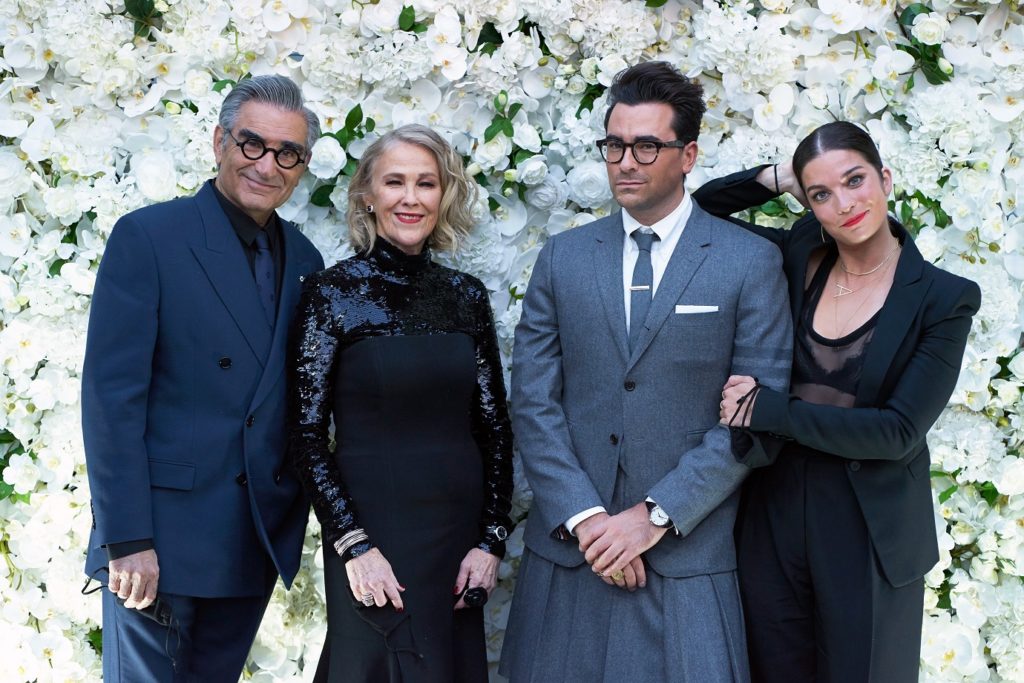Pop culture – a song lyric, a film or a storybook hero – always comes to help me through the hardest of times.
David Rose, from Netflix sitcom Schitt’s Creek, with his radical feminist jumpers, stroppy, sarcastic vulnerability, boho industrial chic (I would soooo shop in Rose Apothecary) and pansexual romance is the best friend I never knew I needed in isolation.
During Melbourne’s COVID19 Stage 4 lockdown, I have become obsessed with him and this series. I don’t think I have loved like this since the Keatons.
I resisted our acquaintance at first, because the idea of an uber-rich family being embezzled out of their fortune and left with only the the title deeds to a joke town they purchased for kicks, was a premise that kind of bored me.
But isolation forced me to give Schitt’s Creek a shot, and I’m so happy I did. Because the story of a disconnected family washed up by capitalism, trapped in a two bed motel room, learning the meaning of true happiness, is the perfect pandemic allegory.
With Catherine O’Hara, Eugene Levy, Dan Levy and Annie Murphy winning their #Emmys tonight, that means our little Canadian show is the first comedy OR drama to ~ever~ sweep all four acting categories, and that is absolutely wild 🇨🇦 pic.twitter.com/fEUnaLoDBr
— Schitt’s Creek (@SchittsCreek) September 21, 2020
There are many things I love about this show. It is incredibly funny, progressive, and brilliantly theatrical. (Not to mention Moira’s wigs). But the thing I love most about it is that Schitt’s Creek is a place free from toxic masculinity. With the exception of obnoxious local, Mayor Roland, (more mug than misogynist), the male characters defy all the usual gendered stereotypes.
Johnny Rose is a failed dad and businessman making amends. He constantly cedes the limelight of life to his soapie star wife, Moira in a way that barely raises one of his very bushy eyebrows. When he loses everything he owns, Johnny doesn’t punch or push anyone in anger. Instead he raises his voice, swears and is regretful. There is no physical violence in Schitt’s Creek.
David Rose, prodigal son, is the resident anti-hero. His sexual fluidity delivers the show its pathos and poignancy as we watch him transform from a victim of aggressive city life with all its bullying, fake friendships and failed relationships to find true love on the outskirts of town.
David and Patrick’s love story is one of the BEST romances I have seen on TV in years. I find myself binge watching them get together over and over because the chemistry between actors Dan Levy and Noah Reid is electric and gorgeous. The episode when Patrick serenades David! OMG. Swoon.
There is ZERO homophobia on this show. Love is love in Schitt’s Creek without comment or fanfare.
It would have been easy to typecast patriarchy via various love interests of David’s sister, Alexis. We certainly get a glimpse that her past life as a jet-setting party girl was littered with hot, disposable beaus who didn’t treat her well. So sucked into the playboy myth is she, that when ultimate good guy, Ted the vet falls for her, she’s totally confused by his love and respect for her.
Mutt, the beardy man who makes up a classic sitcom love triangle, also falls short of the usual jock stereotype. We see him through Alexis’ eyes as an ecologically conscious, shirtless hottie. The sexual gaze of Schitts – the looking, the lusting – is through the eyes of women and gay men. And it’s delightful.
I am fortunate to have men in my life who do not fit into archetypal “blokey” stereotypes. I watch Schitt’s Creek with my husband who tears up during scenes. And my son enjoys it too. But outside of these relationships, I have known only toxic masculinity and its devastation on me, the men I care about and society.
So when I cry, and grin & feel deep emotions for this show it’s because I yearn for the world it’s made – where men and women are best friends, lovers, advocates and implicitly understand that the riches of life cannot be bought.
Schitt’s has me imagining a world post isolation where we all make better choices to build back after exile; to move beyond old, rigid expectations of how to work, how to run a family and how to love.


